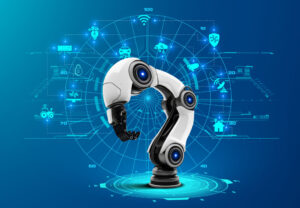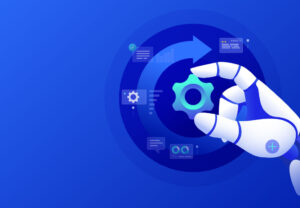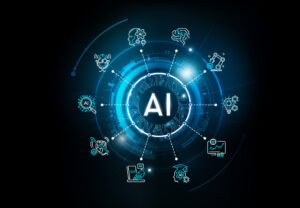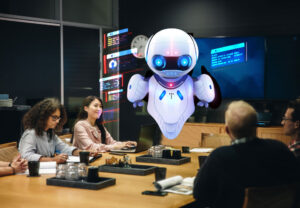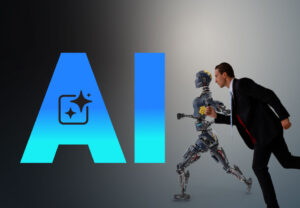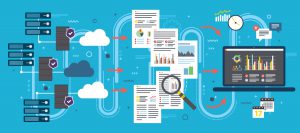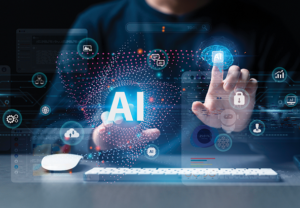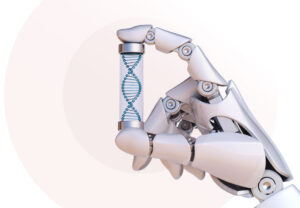Precision at Scale: AI’s Strategic Role in Modern Manufacturing Operations
“AI is reshaping manufacturing with precision-driven strategies, from predictive maintenance to adaptive supply chains. GenAI, Agentic AI, and ML models, backed by real-world metrics and use cases. Learn how Motherson Technology Services enables scalable, data-led transformation for competitive advantage in a rapidly evolving industrial space.”
Artificial intelligence has transcended the experimental phase in manufacturing, emerging as a strategic imperative for operational precision at enterprise scale. More than 77% of manufacturers have implemented AI to some extent as compared to 70% in 2023, whilst 95% of predictive maintenance adopters reported a positive ROI, with 27% achieving results in less than a year. [1] [3]
The convergence of Agentic AI for supply chain optimisation, Generative AI in predictive maintenance models, and custom machine learning for quality control is delivering measurable outcomes: organisations implementing predictive maintenance programmes witness a 70%-75% elimination of breakdowns, alongside a 5X to 7X increase in ROI, 25%-30% reduction in maintenance costs, and 35%-45% reduction in downtime. Manufacturing enterprises that embrace strategic AI roadmap for production efficiency whilst addressing AI adoption challenges industrial automation are positioning themselves for sustained competitive advantage in an increasingly complex global marketplace. [7][3][1][5]
AI Adoption in Manufacturing: Current Landscape and Trajectory
- 1. Adoption Metrics and Regional Variations
The manufacturing sector demonstrates accelerating AI adoption rates, with substantial regional variations, reflecting digital maturity levels. AI in manufacturing is experiencing a 30%+ CAGR (Compound Annual Growth Rate). It is, however, important to note that only 26% of companies have developed the necessary capabilities to move beyond proofs of concept and generate tangible value, indicating significant opportunities for strategic advancement.
Regional analysis reveals distinct adoption patterns,
- a) North American Manufacturing: Leading in AI infrastructure investment with 82% of manufacturers increasing AI budgets for 2025
- b) European Manufacturing: Strong emphasis on regulatory compliance and data governance frameworks
- c) Asian Manufacturing: Rapid scaling of AI-driven automation with focus on production efficiency optimisation
- 2. Digital Maturity Spectrum
Manufacturing organisations fall across a digital maturity spectrum from explorers to champions, with high-maturity entities demonstrating superior ROI of artificial intelligence in manufacturing outcomes:
- a) Explorer Stage (25% of manufacturers): Limited AI pilot programmes with basic automation
- b) Adopter Stage (35% of manufacturers): Targeted AI implementation in specific operational areas
- c) Expander Stage (25% of manufacturers): Cross-functional AI integration with measurable performance improvements
- d) Champion Stage (15% of manufacturers): Comprehensive AI ecosystem with advanced analytics and autonomous decision-making capabilities
Champions report remarkable performance indicators: 30% reduction in unplanned downtime, 25% decrease in maintenance costs, and significant improvements in overall equipment effectiveness (OEE) metrics. [7][3][1][5]
Strategic Role of GenAI in Manufacturing
- 1. Transformative Capabilities Across Operations
Generative AI represents a paradigm shift in manufacturing operations, extending beyond traditional analytical applications to enable creative problem-solving and adaptive manufacturing processes. Market projections indicate GenAI in manufacturing will reach USD 10.5 billion by 2033, driven by its capabilities in rapid product design iteration, document standardisation, and predictive analytics enhancement.
GenAI applications demonstrate strength in,
- a) Product Development Acceleration: Rapid prototyping and design iteration capabilities reducing time-to-market by 40-60%
- b) Process Optimisation: Real-time parameter adjustment based on production data analysis
- c) Supply Chain Intelligence: Dynamic demand forecasting and inventory optimisation models
- d) Quality Assurance Enhancement: Automated defect pattern recognition and corrective action recommendations
- 2. Digital Twin Integration and AI Complementarity
The convergence of digital twin technology with artificial intelligence creates unprecedented opportunities for manufacturing optimisation and operational excellence. Key performance indicators demonstrate substantial benefits,
- a) Development Efficiency: Digital twins deliver optimised development times between 20% to 50% and up to 25% lower CO2 emissions
- b) Market Growth Trajectory: AI-powered digital twin market projected to reach USD 81.3 billion by 2034, growing at 36.2% compound annual growth rate
- c) Current Adoption Rates: 44% of manufacturers have implemented digital twin technology, whilst 15% are planning deployment within the next planning cycle
Core Digital Twin Capabilities in Manufacturing
- a) Comprehensive Virtual Replication: Complete digital representations of physical assets, processes, and systems enabling real-time monitoring and control
- b) Operational Data Analysis: Continuous analysis of production data to identify bottlenecks and optimise process efficiency
- c) Real-Time Factory Monitoring: Digital representations of factory floors and production lines providing immediate operational visibility
AI Enhancement of Digital Twin Strategic Advantages
- a) Enhanced Predictive Maintenance: AI-enabled digital twins analyse real-time operational data to predict equipment failures before occurrence, enabling timely maintenance interventions
- b) Advanced Predictive Analytics: Detailed insights and data-driven predictions invaluable for strategic planning and operational decision-making
- c) Comprehensive Scenario Analysis: “What-if” simulation capabilities allowing manufacturing teams to evaluate operational changes before implementation
- d) Pattern Recognition Excellence: AI algorithms process vast amounts of sensor data, identifying patterns and anomalies impossible for human operators to detect manually
- e) Quality Control Prediction: AI-enhanced digital twins predict product defects based on process parameters and environmental conditions
- f) Continuous Process Optimisation: Machine learning algorithms enable automated parameter adjustments based on performance feedback, creating self-improving manufacturing systems
- 3. Integration Architecture and Workflow Enhancement
Modern manufacturing environments require GenAI integration that seamlessly connects with existing manufacturing execution systems (MES) and enterprise resource planning (ERP) platforms. Successful implementations focus on.
- a) Simulation and Digital Twin Enhancement: GenAI-powered digital twins providing real-time operational insights and predictive scenario analysis
- b) Customer Service Transformation: Intelligent chatbots and automated documentation systems improving client interaction efficiency
- c) Regulatory Compliance Support: Automated documentation generation and compliance monitoring across multiple jurisdictions
The strategic value of GenAI lies in its ability to augment human decision-making whilst maintaining the precision and reliability essential for manufacturing excellence. [6] [3]
Importance of Agentic AI in Manufacturing
- 1. Autonomous Intelligence and Human-AI Collaboration
Agentic AI represents the evolution towards intelligent, autonomous systems capable of independent decision-making within defined parameters whilst maintaining human oversight and control. This technology becomes particularly crucial as manufacturers transition towards Industry 5.0 paradigms emphasising human-centric, sustainable, and resilient operations.
Key characteristics of effective Agentic AI systems include,
- a) Explainable Decision-Making: Transparent algorithms enabling operators to understand and validate autonomous decisions
- b) Real-Time Adaptability: Dynamic response to changing production conditions without human intervention
- c) Human-in-the-Loop Framework: Seamless collaboration between human expertise and artificial intelligence capabilities
- d) Contextual Learning: Continuous improvement through operational experience and pattern recognition
- 2. High-Value Agentic Applications
Manufacturing environments particularly benefit from Agentic AI deployment in critical operational areas.
- a) Anomaly Detection Systems: Autonomous identification and initial response to equipment irregularities before human intervention
- b) Flexible Production Line Management: Dynamic reconfiguration of manufacturing processes based on demand fluctuations and resource availability
- c) Adaptive Quality Control: Real-time adjustment of quality parameters based on incoming material variations and environmental conditions
- d) Predictive Supply Chain Orchestration: Autonomous supplier communication and logistics optimisation based on production forecasts
The implementation of Agentic AI for supply chain optimisation demonstrates promise, with early adopters reporting 15-20% improvements in delivery precision and 12-18% reduction in inventory carrying costs. [1] [4]

ML-Driven Custom AI Models in Manufacturing
- 1. Model Selection and Performance Comparison
Manufacturing environments demand AI models tailored to specific operational requirements, with different algorithms demonstrating superior performance across distinct applications. Comprehensive analysis reveals optimal model selection criteria.
- a) Deep Learning Networks: Excel in complex pattern recognition applications, particularly visual inspection systems with 95-99% accuracy rates for defect identification
- b) Random Forest Algorithms: Demonstrate superior performance in predictive maintenance scenarios, with 85-92% prediction accuracy for equipment failure forecasting
- c) Support Vector Machines (SVMs): Optimal for classification tasks in quality control applications, particularly effective for multi-dimensional product specification compliance
- d) Convolutional Neural Networks (CNNs): Industry standard for computer vision applications, achieving sub-millimetre precision in dimensional quality assessments
- 2. Custom Model Development and Deployment
Successful custom machine learning for quality control implementation requires systematic approach to model development.
- a) Feature Engineering Optimisation: Identification and extraction of relevant operational parameters specific to individual manufacturing environments
- b) Training Data Quality Assurance: Comprehensive data collection protocols ensuring model reliability and accuracy
- c) Cloud-Based Deployment Architecture: Scalable infrastructure supporting real-time inference and model updates
- d) Performance Monitoring Systems: Continuous model performance assessment and retraining protocols
Advanced manufacturing facilities implement Principal Component Analysis (PCA) and t-distributed Stochastic Neighbour Embedding (t-SNE) for dimensionality reduction in complex quality control scenarios, enabling efficient processing of high-dimensional sensor data whilst maintaining predictive accuracy. [3] [5] [1] [8]
High-Value Use Cases with Quantified Outcomes
- 1. Predictive Maintenance Excellence
Predictive maintenance represents the most mature and successful AI application in manufacturing, with organisations implementing programmes seeing a 70%-75% elimination of breakdowns alongside a 10X increase in ROI. Leading manufacturers report.
- a) Maintenance Cost Reduction: 25-30% decrease in total maintenance expenditure through optimised scheduling and resource allocation
- b) Downtime Elimination: 35-45% reduction in unplanned production interruptions through early failure detection
- c) Asset Lifespan Extension: 15-25% increase in equipment operational life through optimal maintenance timing
Case study analysis reveals 90% of top machine manufacturers have invested significantly in predictive maintenance technologies, with machine learning algorithms achieving 92-97% accuracy in failure prediction across diverse equipment categories. [3] [1]
- 2. Advanced Quality Control Systems
80% of leading manufacturing firms have implemented machine vision systems for real-time quality assessment, delivering substantial operational improvements.
- a) Defect Detection Accuracy: 99.5%+ accuracy rates in visual inspection applications, surpassing human inspection capabilities
- b) Production Speed Enhancement: 40-60% increase in inspection throughput without quality compromise
- c) Waste Reduction: 20-35% decrease in material waste through early defect identification and process correction
Specific implementations demonstrate exceptional results: 3B-Fibreglass achieved 95% accuracy in breakage prediction using deep learning algorithms, whilst ZF Friedrichshafen’s random forest-based tool fracture detection system maintains 99% accuracy rates in production environments. [5] [3] [1]
- 3. Supply Chain Optimisation and Intelligence
AI-driven supply chain management transforms traditional reactive approaches into proactive, predictive systems. 41% of manufacturers optimise supply chain operations using AI, resulting in.
- a) Inventory Optimisation: 15-25% reduction in carrying costs through demand prediction accuracy improvements
- b) Delivery Performance: 90-95% on-time delivery rates through intelligent logistics coordination
- c) Supplier Relationship Management: Automated performance monitoring and risk assessment capabilities
Advanced implementations integrate IoT sensors, machine learning algorithms, and blockchain technology to create transparent, resilient supply chains capable of autonomous adaptation to market fluctuations and disruption scenarios. [5] [3]
AI Adoption Challenges in Manufacturing
- 1. Skills Gap and Workforce Transformation
The manufacturing sector faces substantial challenges in AI adoption, with skills shortage representing the primary barrier to successful implementation. Industry analysis identifies critical capability gaps.
- a) Technical Expertise Deficit: Shortage of data scientists, AI engineers, and analytics specialists, familiar with manufacturing environments
- b) Cross-Functional Integration: Need for professionals capable of bridging traditional manufacturing knowledge with modern AI capabilities
- c) Change Management Requirements: Cultural transformation necessary for successful human-AI collaboration
Successful organisations invest in comprehensive upskilling programmes, with 65% of AI-mature manufacturers reporting significant training investments and the development of internal analytics translator roles. [7] [1]
- 2. Data Governance and Infrastructure Challenges
Integrating AI with existing MES/ERP systems presents complex technical and organisational challenges.
- a) Data Quality Assurance: Manufacturing data often requires extensive cleaning and standardisation before AI model deployment
- b) System Interoperability: Legacy manufacturing systems may lack APIs and integration capabilities necessary for modern AI platforms
- c) Real-Time Processing Requirements: Manufacturing environments demand sub-second response times incompatible with traditional batch processing approaches
Data governance for manufacturing AI requires comprehensive frameworks addressing data lineage, quality metrics, security protocols, and regulatory compliance across multiple jurisdictions. [4] [1]
- 3. ROI Uncertainty and Investment Justification
Despite demonstrated benefits, many manufacturers struggle with AI investment justification due to:
- a) Measurement Complexity: Difficulty quantifying intangible benefits such as improved decision-making quality and risk reduction
- b) Implementation Timeline Uncertainty: Variable deployment schedules affecting ROI calculation accuracy
- c) Technology Evolution Pace: Rapid advancement in AI capabilities creating concerns about technological obsolescence
Successful AI adopters implement phased deployment strategies with clear performance milestones and measurable outcomes at each stage. [2] [7]
Strategic Approach: Scalable AI Adoption Framework
- 1. Six Building Blocks for Manufacturing AI Success
Comprehensive AI transformation requires systematic attention to interconnected organisational capabilities.
Business Applications Layer Strategic identification and prioritisation of high-value use cases aligned with operational objectives and competitive requirements.
Technology Infrastructure Modular, Cloud-based architecture supporting seamless scaling and integration of AI capabilities across diverse manufacturing environments.
Data Management Foundation Centralised data lakes with real-time analytics capabilities and robust governance frameworks ensuring data quality and compliance.
Talent Development Programme Comprehensive workforce transformation including technical training, change management, and culture development initiatives.
Process Integration Framework Systematic integration of AI capabilities into existing operational procedures with clear accountability and performance measurement systems.
Cultural Transformation Initiative Organisation-wide commitment to experimentation, continuous learning, and human-AI collaboration principles.
- 2. Implementation Architecture and Scaling Strategy
Successful AI deployment follows proven architectural principles.
- a) Microservices Architecture: Modular AI services enabling independent scaling and maintenance of individual capabilities
- b) API-First Design: Comprehensive integration capabilities supporting diverse manufacturing system requirements
- c) Edge Computing Integration: Real-time processing capabilities for time-sensitive manufacturing applications
- d) Open-Source Foundation: Flexible, cost-effective platforms supporting rapid innovation and customisation
Leading manufacturers implement AI-driven Overall Equipment Effectiveness (OEE) monitoring systems achieving 15-25% performance improvements through real-time optimisation and predictive intervention capabilities. [1] [5]
- 3. Motherson Technology Services Advantage
MTSL provides comprehensive AI transformation services specifically designed for manufacturing environments.
Advanced Digital Engineering Custom AI model development and deployment services optimised for manufacturing operational requirements and performance standards.
GenAI Integration Services Seamless integration of generative AI capabilities into existing manufacturing workflows with focus on productivity enhancement and decision support.
Agentic AI Implementation Development and deployment of autonomous AI systems supporting trusted human-AI collaboration in critical manufacturing processes.
Workforce Enablement Programme Comprehensive training and change management services ensuring successful adoption and sustained value realisation.
Data Platform Development Complete data governance and management solutions supporting AI deployment and ongoing operational requirements.
MTSL’s approach emphasises measurable outcomes with ROI tracking tools, comprehensive use case pipeline management, and responsible AI deployment frameworks ensuring sustainable competitive advantage.

Conclusion
- 1. Proven Value Realisation
Manufacturing organisations implementing comprehensive AI strategies report substantial operational improvements across multiple dimensions.
- a) Operational Efficiency: 20-35% improvement in overall production efficiency through AI-driven process optimisation
- b) Cost Reduction: 15-30% decrease in operational costs through predictive maintenance, quality improvement, and waste reduction
- c) Agility Enhancement: 40-60% improvement in response times to market changes and customer requirements
- d) Resilience Building: Significant risk reduction through predictive analytics and autonomous response capabilities
- 2. Future-Proofing Manufacturing Operations
An integrated AI strategy led by experienced partners like Motherson Technology Services ensures manufacturing networks maintain competitive positioning through.
- a) Continuous Innovation: Ongoing AI capability enhancement aligned with technological advancement and market evolution
- b) Scalable Architecture: Infrastructure supporting growth and adaptation to changing operational requirements
- c) Sustainable Practices: AI-driven optimisation supporting environmental and social responsibility objectives
- a) Global Competitiveness: Advanced automation and intelligence capabilities enabling competition in global markets
The manufacturing sector stands at a critical inflection point where AI adoption determines long-term viability and success. Organisations that commit to deliberate, data-driven AI implementation with experienced partners will establish sustainable competitive advantages whilst those that delay adoption risk obsolescence in an increasingly intelligent and automated global marketplace.
Strategic AI deployment requires commitment to continuous learning, innovation, and leadership engagement. The evidence demonstrates clear benefits for organisations willing to invest in comprehensive transformation programmes that address technical, cultural, and operational requirements simultaneously. The question is not whether AI will transform manufacturing, but whether individual organisations will lead or follow this transformation.
References
[1] https://www.pwc.com/gx/en/industrial-manufacturing/pdf/intro-implementing-ai-manufacturing.pdf
[2] https://www.nam.org/wp-content/uploads/2024/05/NAM-AI-Whitepaper-2024-1.pdf
[3] https://artsmart.ai/blog/ai-in-the-manufacturing-statistics/
[4] https://www.springerprofessional.de/en/artificial-intelligence-in-manufacturing/26715038
[5] https://www.thoughtminds.io/ai-in-manufacturing/
[6] https://www.thoughtminds.io/manufacturing/
[8] https://www.sciencedirect.com/science/article/pii/S000785062400115X
[9] https://www.smartsocs.com/ai-transforming-industries-innovation-and-growth
[10] https://whitepapers.digital/ai-in-manufacturing-insights-implementation-impact-may-2024/
[11] https://www.taira-m.jp/AI%20White%20Paper%202024.pdf
[13] https://www.thoughtminds.io/a-new-paradigm-in-manufacturing-embracing-generative-ai/
[15] https://whitepapers.digital/ai-in-manufacturing-key-insights-and-advanced-implementations-may-2024/
[16] https://www.sciencedirect.com/science/article/pii/S2773207X24001386
[18] https://www.thoughtminds.io/generative-ai-explained/
[19] https://www.automate.org/industry-insights/ai-in-manufacturing-real-stories-of-success
[23] https://nasscom.in/knowledge-center/publications/nasscom-ai-adoption-index
[24] https://www.thoughtminds.io/ai-development-services/
[25] https://artsmart.ai/blog/ai-in-the-art-market-statistics/
[27] https://www.thoughtminds.io/aistrategy/
[28] https://artsmart.ai/blog/ai-in-supply-chain-statistics/
[30] https://www.mindinventory.com/blog/ai-in-manufacturing/
[31] https://link.springer.com/article/10.1007/s10799-024-00436-z
About the Author:

Rajen Ghosh is a strategy and digital transformation leader with 20+ years of experience in the IT Industry working across the Americas, Europe, and the Middle East. He comes with deep expertise in creating and executing business strategy, solving complex business challenges, building high-performing teams, and overseeing complex technology-led transformation programmes. He has helped many organizations across pharmaceutical, manufacturing, financial services, and FMCG industry sectors to adopt a data-first and AI-first operating model. He is a vivid speaker and AI enthusiast who loves to speak on technology transformation and artificial intelligence in industry forums as well as with the analyst & advisor community.

 September 16, 2025
September 16, 2025 Rajen Ghosh
Rajen Ghosh



